Ryanair flight lands at Ben Gurion Airport. (March 31, 2025) (Photo: FLASH90 via “The Times of Israel”)
Ryanair suspends all ‘Israel’ flights over dispute with Ben Gurion Airport
Ryanair, Europe’s largest low-cost carrier, has confirmed the immediate and indefinite suspension of all flights to and from Tel Aviv’s Ben Gurion Airport (TLV), following an unresolved commercial standoff with the “Israel Airports Authority” (IAA).
The decision, which removes 22 routes and 1 million seats from the ‘Israeli’ market for the upcoming winter 2025/2026 schedule, was triggered by the airport’s refusal to grant two key demands: a guarantee of low-cost operating rates and the confirmation of the airline’s future flight slots.
A Ryanair spokesperson expressed the company’s frustration, stating, "We are fed up having our low-fare flights repeatedly messed around by Ben Gurion Airport".
The Houthis have been firing constant missile and drone barrages at ‘Israel’, in response to the aggression on the Gaza Strip, which causes regular disruptions of service at the airport.
Ryanair Group CEO Michael O'Leary previously minimized the market’s importance, noting that walking away "wouldn't cost me much of a thought," suggesting a potential permanent exit.
The dispute centers on two non-negotiable requirements for the low-cost model to remain viable:
1. The Terminal Cost Dispute
Ryanair’s business model depends on operating from the budget-friendly Terminal 1 (T1). Due to regional security concerns, T1 has been repeatedly closed, forcing low-cost carriers to shift to the main international Terminal 3 (T3).
However, the T3 fee structure is prohibitively expensive. Operational charges at T3 are often more than double those at T1.
For instance, the landing fee for T3 is approximately $26 per passenger, sharply contrasting with the $11 per passenger rate at T1. Ryanair argued that operating low-fare services from the high-cost T3 renders the routes "loss-making".
The airline stipulated that it would cooperate with temporary transfers to Terminal 3 only if the IAA provided a written guarantee that charges would remain in accordance with Terminal 1 rates.
2. The Flight Slot Controversy
The second critical demand involved regulatory certainty for long-term planning. Ryanair required the immediate confirmation and restoration of its historic flight slots for the subsequent Summer 2026 (S26) schedule.
The airline noted that the IAA had refused to confirm its S26 slots even though those flight schedules are already on sale.
Ryanair attributed flight cancellations during the summer to safety concerns, but these necessary cancellations likely caused the airline to fall afoul of the Worldwide Airport Slot Guidelines (WASG) "Use It or Lose It" rule. This international rule dictates that if an airline fails to operate slots at least 80% of the time, it forfeits its right to claim those historic timings in the next equivalent season.
Ryanair's CEO Eddie Wilson had previously warned the IAA that the unstable slot allocation policy jeopardized profitable operations 18 months in advance.
IAA Rejects Ultimatum
The “Israel Airports Authority” has maintained a firm position, rejecting Ryanair's demands. The IAA insisted that it treats all carriers equally and operates strictly according to international WASG rules.
The authority reinforced its stance on non-discriminatory treatment by pointing out that other major international carriers, including British Airways and easyJet, were also forced to relinquish slots for S26 after failing to meet the usage requirements. The IAA stressed that it "does not operate under threats of flight cancellations".
The suspension marks a significant blow to inbound tourism and competition, as Ryanair’s exit is expected to contribute to higher fares and reduced capacity on key Europe-TLV routes.




